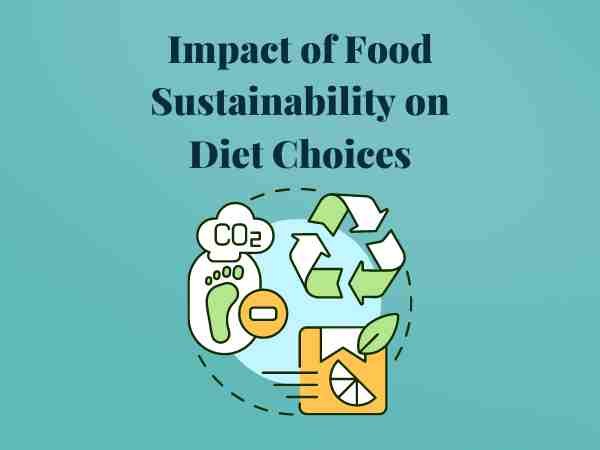The choices we make about what we eat have a ripple effect that extends far beyond our taste buds. In today’s world, these choices are increasingly influenced by the concept of food sustainability – a holistic approach to food production, consumption, and waste reduction that minimizes environmental impact while ensuring healthy food systems for future generations. This article delves into the world of sustainable food practices and explores how they are shaping our diets.
Understanding Sustainable Food Practices
A sustainable food system prioritizes environmental responsibility throughout the entire food chain, from farm to fork. Here are some key principles that define sustainable food practices:
- Environmentally-friendly production methods: This includes practices like organic farming, which minimizes the use of pesticides and synthetic fertilizers, and regenerative agriculture, which focuses on improving soil health and biodiversity.
- Local and regional food systems: Reducing the distance food travels from farm to table cuts down on transportation emissions and supports local farmers.
- Reduced food waste: Food waste represents a significant environmental burden. Sustainable practices focus on minimizing waste throughout the supply chain, from production and processing to distribution and consumption.
- Ethical sourcing: This involves ensuring fair treatment for farmers and workers, promoting animal welfare in livestock production, and responsible sourcing of seafood to protect marine ecosystems.
How Sustainability is Changing What We Eat
Sustainable food practices are influencing consumer dietary choices in several ways:
- Rise of Plant-Based Diets: Animal agriculture has a significant environmental footprint. The production of meat and dairy contributes to greenhouse gas emissions, deforestation, and water pollution. Consumers seeking a more sustainable diet are increasingly opting for plant-based options, including fruits, vegetables, legumes, and whole grains.
- Increased Demand for Local and Seasonal Produce: Consumers are becoming more interested in knowing where their food comes from and how it’s produced. Farmer’s markets, Community Supported Agriculture (CSA) programs, and local grocery stores offering locally-sourced produce are gaining popularity.
- Focus on Whole Foods: Sustainable practices often emphasize minimally processed, whole foods. This aligns with a growing trend towards healthier eating habits, with consumers opting for options that are both good for their body and the planet.
- Mindful Consumption and Reduced Waste: Food waste is a major sustainability issue. Consumers are becoming more aware of this problem and are adopting practices like meal planning, buying only what they need, and utilizing leftovers to reduce waste.
Also check: The Role of Nutrition in Mental Health
The Role of Transparency and Education
Consumer interest in sustainable food choices is growing, but navigating the landscape can be challenging. Transparency and education play a crucial role in encouraging sustainable dietary choices.
- Labeling and certifications: Clear and transparent labeling of food products allows consumers to make informed choices. Organic, Fair Trade, and food-specific certifications like Rainforest Alliance Certified can help consumers identify products produced according to sustainable practices.
- Consumer education: Educating consumers about the environmental impact of different food choices empowers them to make informed decisions. Initiatives like school food programs promoting healthy and sustainable eating habits, and campaigns raising awareness about food waste, are crucial in this regard.
Challenges and Opportunities in Sustainable Diets
While the trend towards sustainable food choices is positive, there are challenges to address:
- Cost: Organic and locally-sourced products can sometimes be more expensive than conventional options. Strategies like supporting local farmers markets and budget-friendly meal planning using seasonal produce can help make sustainable choices more accessible.
- Accessibility: Not everyone has access to fresh, locally-sourced food options. Expanding community agriculture programs and increasing the availability of affordable, sustainable food choices in low-income areas are essential.
Despite these challenges, the opportunities associated with sustainable food choices are significant:
- Improved health outcomes: Sustainable diets often align with healthier eating patterns, emphasizing whole foods, fruits, and vegetables.
- Reduced environmental impact: By prioritizing sustainable practices and reducing food waste, consumers contribute to a healthier planet, tackling issues like climate change and biodiversity loss.
- Stronger communities: Supporting local farmers and businesses strengthens the local economy and community food systems.
Also check: Healthy Eating for Blood Sugar Control
The Future of Food: A Sustainable Plate for All
The impact of food sustainability on our diets is undeniable. As consumers become more aware of the environmental implications of their food choices, a shift towards sustainable eating habits is gaining momentum. By supporting sustainable practices, prioritizing plant-based diets, and reducing food waste, we can create a future where a healthy diet goes hand-in-hand with a healthy planet.
This is just the beginning of the conversation around sustainable food choices. Technological advancements in agriculture, such as vertical farming and precision agriculture, offer exciting possibilities for increasing food production while minimizing environmental impact. Additionally, innovative food companies are developing plant-based alternatives to meat and dairy products, making sustainable choices more accessible and appealing









